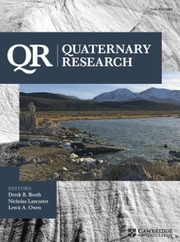Crossref Citations
This article has been cited by the following publications. This list is generated based on data provided by
Crossref.
Dickinson, William R.
1998.
Geomorphology and Geodynamics of the Cook-Austral Island-Seamount Chain in the South Pacific Ocean: Implications for Hotspots and Plumes.
International Geology Review,
Vol. 40,
Issue. 12,
p.
1039.
Dickinson, William R.
2001.
Paleoshoreline record of relative Holocene sea levels on Pacific islands.
Earth-Science Reviews,
Vol. 55,
Issue. 3-4,
p.
191.
Baker, R.G.V
Haworth, R.J
and
Flood, P.G
2001.
Warmer or cooler late Holocene marine palaeoenvironments?: interpreting southeast Australian and Brazilian sea-level changes using fixed biological indicators and their δ18O composition.
Palaeogeography, Palaeoclimatology, Palaeoecology,
Vol. 168,
Issue. 3-4,
p.
249.
Woodroffe, C.D.
and
Morrison, R.J.
2001.
Reef-island accretion and soil development on Makin, Kiribati, central Pacific.
CATENA,
Vol. 44,
Issue. 4,
p.
245.
Cann, J.H.
Harvey, N.
Barnett, E.J.
Belperio, A.P.
and
Bourman, R.P.
2002.
Foraminiferal biofacies eco-succession and Holocene sealevels, Port Pirie, South Australia.
Marine Micropaleontology,
Vol. 44,
Issue. 1-2,
p.
31.
Zhao, Jianxin
and
Yu, Kefu
2002.
Timing of Holocene sea-level highstands by mass spectrometric U-series ages of a coral reef from Leizhou Peninsula, South China Sea.
Chinese Science Bulletin,
Vol. 47,
Issue. 4,
p.
348.
DICKINSON, W
2004.
Impacts of eustasy and hydro-isostasy on the evolution and landforms of Pacific atolls.
Palaeogeography, Palaeoclimatology, Palaeoecology,
Vol. 213,
Issue. 3-4,
p.
251.
Dickinson, William R.
2004.
Picture Essay of Pacific Island Coasts.
Journal of Coastal Research,
Vol. 204,
Issue. ,
p.
1012.
Kench, P.S.
McLean, R.F.
and
Nichol, S.L.
2005.
New model of reef-island evolution: Maldives, Indian Ocean.
Geology,
Vol. 33,
Issue. 2,
p.
145.
Frenzel, Burkhard
2006.
Progress in Botany.
Vol. 67,
Issue. ,
p.
460.
Nunn, Patrick D.
and
Kumar, Roselyn
2006.
Global Change and Integrated Coastal Management.
Vol. 10,
Issue. ,
p.
93.
Kench, Paul S.
McLean, Roger F.
Brander, Robert W.
Nichol, Scott L.
Smithers, Scott G.
Ford, Murray R.
Parnell, Kevin E.
and
Aslam, Mohamed
2006.
Geological effects of tsunami on mid-ocean atoll islands: The Maldives before and after the Sumatran tsunami.
Geology,
Vol. 34,
Issue. 3,
p.
177.
Vousdoukas, M.I.
Velegrakis, A.F.
and
Plomaritis, T.A.
2007.
Beachrock occurrence, characteristics, formation mechanisms and impacts.
Earth-Science Reviews,
Vol. 85,
Issue. 1-2,
p.
23.
Yamano, Hiroya
Kayanne, Hajime
Yamaguchi, Toru
Kuwahara, Yuji
Yokoki, Hiromune
Shimazaki, Hiroto
and
Chikamori, Masashi
2007.
Atoll island vulnerability to flooding and inundation revealed by historical reconstruction: Fongafale Islet, Funafuti Atoll, Tuvalu.
Global and Planetary Change,
Vol. 57,
Issue. 3-4,
p.
407.
Barry, S.J.
Cowell, P.J.
and
Woodroffe, C.D.
2007.
A morphodynamic model of reef-island development on atolls.
Sedimentary Geology,
Vol. 197,
Issue. 1-2,
p.
47.
Nunn, Patrick D.
2007.
Climate, Environment and Society in the Pacific during the Last Millennium.
Vol. 6,
Issue. ,
p.
v.
Woodroffe, Colin D.
2008.
Reef-island topography and the vulnerability of atolls to sea-level rise.
Global and Planetary Change,
Vol. 62,
Issue. 1-2,
p.
77.
Kench, P.S.
Nichol, S.L.
Smithers, S.G.
McLean, R.F.
and
Brander, R.W.
2008.
Tsunami as agents of geomorphic change in mid-ocean reef islands.
Geomorphology,
Vol. 95,
Issue. 3-4,
p.
361.
Barry, S.J.
Cowell, P.J.
and
Woodroffe, C.D.
2008.
Growth-limiting size of atoll-islets: Morphodynamics in nature.
Marine Geology,
Vol. 247,
Issue. 3-4,
p.
159.
Nunn, Patrick D.
2009.
Geomorphological Landscapes of the World.
p.
349.


